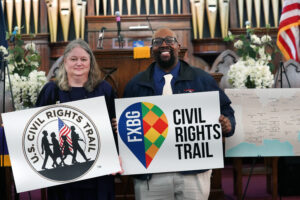
The City of Fredericksburg and the University of Mary Washington on Thursday, Feb. 8, announced that the Fredericksburg Civil Rights Trail has been added to the national collection of landmarks that make up the U.S. Civil Rights Trail.
The U.S. trail, which spans 15 states, includes churches, schools, museums and other locations that played a pivotal role in the Civil Rights Movement. Fredericksburg’s Civil Rights Trail, “Freedom, A Work in Progress,” is the only one of the four sites inducted this year to the U.S. trail that is not a single entity, adding 21 stops to the national narrative.
Community members – many of whom had gathered at the trail’s official launch a year ago – attended an announcement event, held at Shiloh Baptist Church (Old Site), the first stop on the three-mile journey that winds through parts of historic downtown and the UMW campus. Prominent Black citizens and pastors of the church, including the Rev. B.H. Hester and the Rev. Lawrence Davies, played critical roles in the struggle for civil rights and social justice.
Fredericksburg Mayor Kerry Devine kicked off the event by revealing the city’s inclusion on the national trail, a surprise to guests who gathered by invitation to hear a “monumental announcement.”
“The landmarks are part of your history but also part of Virginia history,” Virginia Tourism Corporation President and CEO Rita McClenny told the packed sanctuary. “When you walk up and down these streets where presidents have walked, where the enslaved have walked, where soldiers have walked … if we all can preserve and appreciate and understand that what we have in common is so much greater than what divides us.”
Fredericksburg Vice Mayor Chuck Frye took a personal approach, telling the crowd that the stories he remembers hearing as a child in his grandmother’s living room will now be shared around the world. Presenters took turns reading congratulatory letters from U.S. Rep. Abigail Spanberger, Sen. Mark Warner, Sen. Tim Kaine and United States Vice President Kamala Harris. Poetry and song were part of the presentation, studded with standing ovations, especially for City of Fredericksburg Tourism Sales Manager Victoria Matthews and UMW James Farmer Multicultural Center Assistant Director Chris Williams, the “dynamic duo” that spearheaded the project.



From Shiloh, the trail, a culmination of three years of work led by the City of Fredericksburg and JFMC, gives community members – and now the entire country – a glimpse of Civil Rights history beginning in 1865. Featuring Virginia historical markers, one at the first stop on the 1961 Freedom Rides journey that challenged segregation of interstate travel, the trail’s 21 stops chronicle court rulings and protests from the Jim Crow era to the Black Lives Matter movement.
“It’s really what it represents for the next generation – to have this trail coming onto our campus for our students to see what is possible,” said UMW President Troy Paino. “It offers hope and inspiration.”
The trail includes history-making sit-ins, neighborhoods marred by segregation and locations that illustrate the efforts of Black artists, educators, entrepreneurs, students and many others determined to seek justice and equality for all. The Fredericksburg Area Museum and the Slave Auction Site at the corner of William and Charles streets are also among the trail’s stops, along with UMW’s James Farmer memorial, in honor of the late civil rights icon and Freedom Rides leader who taught history at the University for more than a decade.
“Being added to the U.S. Civil Rights Trail brings more awareness to the important stories here in the City of Fredericksburg,” Matthews said. “We are delighted and honored to be added to the U.S. Civil Rights Trail.”




In addition to Williams and Matthews, the trail was made possible by the efforts of many, including most especially those individuals willing to share their personal stories, who received special recognition at yesterday’s event. Other contributors included Fredericksburg tourism staff, UMW’s Simpson Library Special Collections and University Archives, and Mary Washington faculty and students who engaged in the work through courses in historic preservation, history and American studies, and geography.
“It is truly a historic moment for the City of Fredericksburg to be added to the U.S. Civil Rights Trail,” Williams said. “This has been a life-changing experience. I hope more cities and towns within the Commonwealth follow our blueprint.”
To learn more about this project, visit Freedom, A Work in Progress: The City of Fredericksburg’s Civil Rights Trail. A trail booklet is available for download on the site, or one can be picked up in person at the Fredericksburg Visitor Center. Also visit the U.S. Civil Rights Trail.
